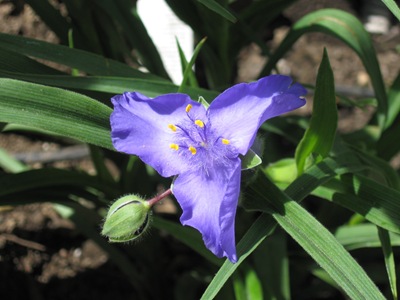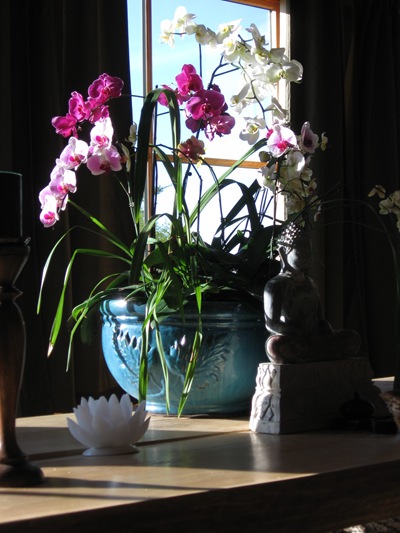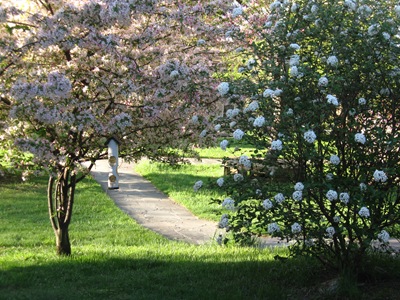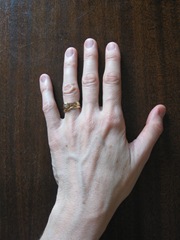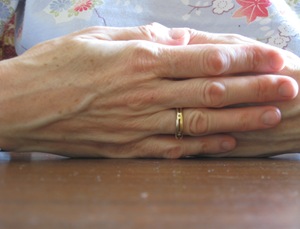An old friend of mine named Bluie Piel, then in her seventies, once led me out the front door of her house to admire her half-shaded lawn, where grass was fighting it out with slabs of New England granite that broke the surface like the backs of half-submerged whales. It was spring, and drifts of self-sown blue scilla were all over the grass, blending exquisitely with the clumps of red-and-yellow wild columbine that had also self-sown there, taking hold even in tiny soil pockets in the rocks. It looked like a miniature alpine meadow, Connecticut-style. “Now, dearie,” Bluie said, “God didn’t do that. I did that.”
-- Barbara Damrosch, The Garden Primer, from chapter on “Wildflowers”
In each of us, there is that capacity to recognize what is good, what is beautiful, what is true. ... Our person is like a garden, filled with many flowering plants. But in the garden there are things other than flowers and plants. If we neglect the garden, it will be overrun with weeds, and our flowers will wither and die.
-- TNH, Shambhala Sun, September 2007
Thầy refers to gardens a lot. Seeds, watering, roses, lettuce, weeds, compost. I find it to be a helpful and encouraging metaphor, inherently alive. Even in trying to characterize the trope, I end up using it: organic, earthy, down-to-earth, vital. I like to garden, so hearing the dharma taught through gardening concepts feels good to me.
However, I admit to some ambivalence about the idea of gardening. A garden is not the same thing as nature. A garden is nature under management. If you leave a garden to follow its natural tendencies, pretty soon you won’t have a garden. You’ll have a natural mess.
In that case, what role should equanimity play? Doesn’t tending a garden tend to water seeds of discrimination?
I know it does in me. My discrimination about plants gets keener and keener. Not just discrimination between weeds and cultivars. I am developing strong preferences about all kinds of plants.
I like columbine, but not phlox. I like native geranium, but not lily of the valley. I like clematis, but not honeysuckle. (Or, maybe in your garden, but not in mine, not in the profusion it tends toward.)

I like campanula (bellflower) but not grape hyacinth. I like hollyhocks, but not double hollyhocks. (I don’t like “double” anything. Old-fashioned single will do.) I like lamium (dead nettle) but not hosta. I really don’t like hosta, to the point that whenever I see it, there is the mental commentary: “I don’t like hosta. Don’t care for it at all.”
The list goes on and on. A lot of these preferences are clear instances of useless discrimination.
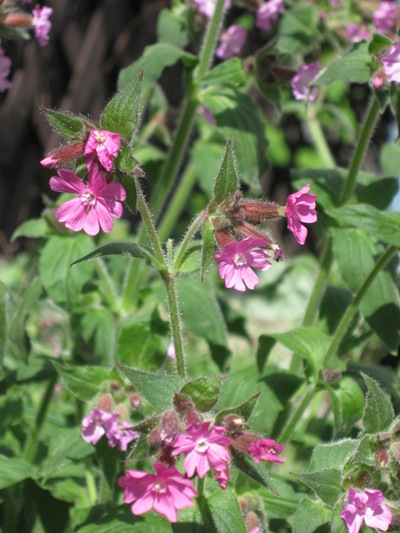
However, some of the discrimination can be described as the watering of positive seeds. Good gardening is, literally, the cultivation of causes and conditions that will allow what is good, beautiful, and true to manifest. That means supplementing the soil with compost, generated from our own garden and kitchen scraps. Loosening the soil so that water and air can penetrate. Replacing the clay, bit by bit, with humus, sand, and fresh soil. Mounting lattice so that plants that need shade get a bit of shade. Watering when the sky is dry.
Cultivating the right causes and conditions means choosing plants that will thrive in the conditions of my garden that can’t be changed. Accepting that hollyhock and muskmallow will not be happy in my garden’s humidity. Working with the condition of “full sun” as it manifests in my garden in August, which is better described as “equatorial desert.” Allowing my fellow denizens, the squirrels and occasional possum and raccoon, to steal the strawberries just as they ripen. Equanimity about the strawberries allows me to see the beauty in their immature, lumpy, bristly form.

Does an unripe strawberry have buddha-nature?
Mu.
The thing about gardening is that it reminds me of what Suzuki Roshi reportedly said about his students: “All of you are perfect just as you are and you could use a little improvement.” Everything is unfolding just as it should (or must, due to past actions) and don’t neglect the weeding. You are luminous and you must practice with diligence.

Let’s close with a gatha from Thầy.
Watering the Garden
The sunshine and the water
have brought about this luxurious vegetation.
The rain of compassion and understanding
can transform the dry desert into a vast fertile plain.
